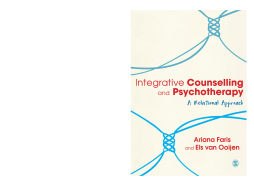
Additional Information
Book Details
Abstract
This is an accessible and user friendly guide to the theory and practice of relational counselling and psychotherapy. It offers a meta-theoretical framework for the integration of the three most popular counselling and psychotherapy modalities: humanistic, psychodynamic and Cognitive-behavioural including mindfulness and compassion based approaches
This exciting new text:
- outlines the history of integration in the field of psychotherapy and counselling
- clarifies the nature of psychotherapeutic integration
- defines different models of integration
- provides a clear and rich discussion of what it means to work relationally
- outlines a coherent and flexible framework for practice, in terms of theory as well as technique
- demonstrates how this framework can be successfully utilised both in brief and long term therapy for a wide range of client issues and problems
- provides a detailed guide to working with the Relational-Integrative Model (RIM) for a range of professional issues, including ethics, research, supervision, therapist self-care and personal development
Brimming with vivid case examples, mind-maps and therapeutic dialogue, this invaluable book will help develop the theoretical knowledge and skills base of students, trainers and practitioners alike.
'In this solid, well-researched book, Faris and van Ooijen explain their Relational Integrative Model (RIM) ' a holistic and relational model that honours the perspectives from different theories' (p1). Faris and van Ooijen come from very different theoretical perspectives and so bring to the book a wide, inclusive and varied knowledge of therapy. This is an academic text, not light reading - a truly meaty read underpinned with extensive background research. But it will be accessible to any therapist, irrespective of their training' -
Therapy Today
'Initially sceptical about yet another therapy 'approach' or 'model', this book quickly won me over with its copious wisdom rooted in a mature engagement with intersubjectivity, and with leading-edge pluralistic postmodern and contemplative perspectives. It is a major, integrating contribution to developing an alive, 'new paradigm' approach to therapy that transcends schoolist parochialism, and challenges the worst excesses of overly 'modernist' therapeutic ideologies and practices' -
Dr Richard House, Research Centre for Therapeutic Education, Roehampton University; author of Therapy Beyond Modernity and In, Against and Beyond Therapy
